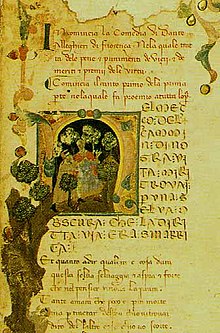Canto

Thecanto(Italian pronunciation:[ˈkanto]) is a principal form of division in medieval and modernlong poetry.[1]
Etymology and equivalent terms
[edit]The wordcantois derived from theItalianword for "song" or "singing", which comes from the Latincantus,"song", from the infinitive verbcanere,"to sing".[1][2]
InOld Saxon poetry,Old English poetry,andMiddle Englishpoetry, the termfittwas sometimes used to denote a section of a long narrative poem, and that term is sometimes used in modern scholarship of this material instead ofcanto.[3][4]
Form and use
[edit]The use of the canto was described in the 1911 edition of theEncyclopædia Britannicaas "a convenient division when poetry was more usually sung by theminstrelto his own accompaniment than read ".[1]There is no specific format, construction or style for a canto and it is not limited to any one type of poetry.
The typical length of a canto varies greatly from one poem to another. The average canto in theDivine Comedyis 142 lines long, while the average canto inOs Lusíadasis 882 lines long.
Examples
[edit]Some famous poems that employ the canto division areEzra Pound'sThe Cantos(116 cantos),Dante'sDivine Comedy(with 100 cantos[5]),Sri Aurobindo'sSavitri(49 cantos),Ludovico Ariosto'sOrlando Furioso(46 cantos),Torquato Tasso'sGerusalemme liberata(20 cantos),Byron'sDon Juan(17 cantos, the last of which is unfinished) andCamões'Os Lusíadas(10 cantos).
Citations
[edit]- ^abcChisholm, Hugh,ed. (1911)..Encyclopædia Britannica(11th ed.). Cambridge University Press.
- ^"Canto",The Merriam-Webster Dictionary.Retrieved 27 September 2015.
- ^'fit | fytte, n.1.',Oxford English Dictionary Online,1st ed. (Oxford: Oxford University Press, 1896).
- ^R. D. Fulk, "The Origin of the Numbered Sections inBeowulfand in Other Old English Poems ",Anglo-Saxon England,35 (2006), 91–109 (p. 91 fn. 1).JSTOR44510947.
- ^"The Divine Comedy: A Study Guide".Cummings Study Guides.Michael J. Cummings.2003.Retrieved2010-01-09.
General references
[edit]- Dutt, Romesh C.(2004).Ramayana.Kessinger Publishing. p. 208.ISBN978-1-4191-4387-8.
